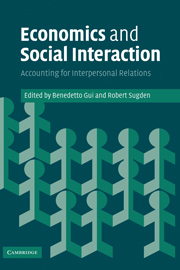Book contents
- Frontmatter
- Contents
- List of illustrations
- Notes on contributors
- Preface
- 1 Why interpersonal relations matter for economics
- 2 From transactions to encounters: the joint generation of relational goods and conventional values
- 3 Fellow-feeling
- 4 Interpersonal interaction and economic theory: the case of public goods
- 5 Under trusting eyes: the responsive nature of trust
- 6 Interpersonal relations and job satisfaction: some empirical results in social and community care services
- 7 On the possible conflict between economic growth and social development
- 8 The logic of good social relations
- 9 The mutual validation of ends
- 10 Hic sunt leones: interpersonal relations as unexplored territory in the tradition of economics
- 11 Authority and power in economic and sociological approaches to interpersonal relations: from interactions to embeddedness
- 12 Interpersonal relations and economics: comments from a feminist perspective
- 13 Economics and interpersonal relations: ruling the social back in
- Envoi
- References
- Index
10 - Hic sunt leones: interpersonal relations as unexplored territory in the tradition of economics
Published online by Cambridge University Press: 15 December 2009
- Frontmatter
- Contents
- List of illustrations
- Notes on contributors
- Preface
- 1 Why interpersonal relations matter for economics
- 2 From transactions to encounters: the joint generation of relational goods and conventional values
- 3 Fellow-feeling
- 4 Interpersonal interaction and economic theory: the case of public goods
- 5 Under trusting eyes: the responsive nature of trust
- 6 Interpersonal relations and job satisfaction: some empirical results in social and community care services
- 7 On the possible conflict between economic growth and social development
- 8 The logic of good social relations
- 9 The mutual validation of ends
- 10 Hic sunt leones: interpersonal relations as unexplored territory in the tradition of economics
- 11 Authority and power in economic and sociological approaches to interpersonal relations: from interactions to embeddedness
- 12 Interpersonal relations and economics: comments from a feminist perspective
- 13 Economics and interpersonal relations: ruling the social back in
- Envoi
- References
- Index
Summary
Is there a place where relation is not merely exchange?
Massimo CacciariIntroduction
‘Political Economy does not treat of the whole of man's nature as modified by the social state, nor of the whole conduct of man in society. It is concerned with him solely as a being who desires to possess wealth, and who is capable of judging that end…It makes entire abstraction of every other human passion or motive’ (Mill, 1897/1836, pp. 132–3).
The present volume argues that ‘relational goods’ are actually part of that ‘wealth’ on which John Stuart Mill focuses, and which still occupies the greatest part of economists' minds. Indeed, interpersonal relations, both outside and inside the economic field, influence economic performance, personal well-being and ‘public happiness’. The aim of this chapter is to investigate what role the analysis of interpersonal relations has played in the various moments and traditions of the history of economics, and, in so doing, to bring to light the reasons behind the methodological choices made in this regard by some leading scholars.
I claim that economists – or, at least, the greatest – have recognised that the interpersonal dimension is important in economic life. Some have even acknowledged that friendship or good conversations are an important component of welfare, generally understood. Nevertheless, not even those who were most persuaded of this claim have thought of making interpersonal relations a direct object of economic investigation, on the basis of the consideration that these aspects have no great relevance for economics, that they are not ‘wealth’.
- Type
- Chapter
- Information
- Economics and Social InteractionAccounting for Interpersonal Relations, pp. 206 - 228Publisher: Cambridge University PressPrint publication year: 2005
- 7
- Cited by



